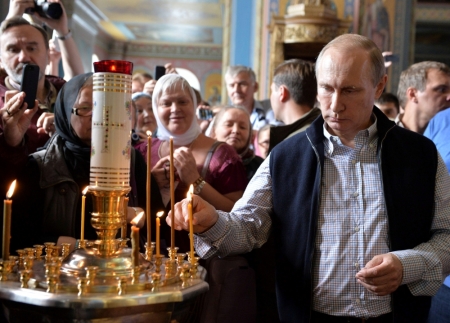Russia Charges American Pastor Under New Anti-Evangelism Law

An American pastor has been charged under Russia's new "anti-terrorism" law for conducting a religious service in a private home and sticking an advertisement in a public place inviting people to worship. The law puts severe restrictions on religious freedom by banning religious gatherings in homes and regulating propagation of religion.
Pastor Donald Ossewaarde, an independent Baptist missionary who has been living in Oryol, a town 224 miles south of Moscow, for about one and a half decades, has appealed the charges against him, and attended a hearing earlier during the week.
The pastor was charged and convicted in August, he says on his website. "I was accused of gluing two Gospel tracts to a bulletin board at the entrance of an apartment building" and "of conducting a religious service in a private home, which they said was a violation of the new anti-missionary law."
The 55-year-old pastor, who lives in Russia with his wife, was arrested on Aug. 14 and fined 40,000 rubles, a little more than $600.
"The accusation also claimed that I was at fault for not notifying the government before I began my religious group activities," he says. "I pointed out that, while the law allows people to form an organized religious group, it does not require them to do so. People are free to gather together for worship, whether or not they officially organize."
Speaking about the appeal hearing on Friday, the pastor writes, "The police … introduced new evidence, which should have been presented from the very beginning. They brought in documents to show I am affiliated with BIMI (Baptist International Missions, Inc.) of Chattanooga, Tennessee, which they said was further proof that I was acting as a foreign agent, representing a foreign religious organization. My lawyer and I were given time to examine the documents, and we explained to the court that BIMI is a service organization that collects my donations, forwards them to me, and provides other support services. I am not an employee of BIMI, nor do I teach 'BIMI doctrine,' and I am certainly not trying to get Russian people to 'join BIMI.' By the law's own definition of missionary activity, I have not done anything illegal."
The pastor spoke to Baptist Press on the phone. "I really think that the political situation in Russia has reached a point where they are going to, one way or the other, they're going to get rid of me," he was quoted as saying. "So I really decided to end my operations here. It's sad because there are people here that really enjoy what we do. It's a big part of their life."
The legislation prohibits the exercise of any missionary activity in residential areas, and also requires believers wanting to share their faith with others, even on the Internet, to possess certain documents from a religious association. It provides for a fine of $75 to $765 if the violator is a Russian citizen, and a fine of up to $15,265 in case of an organization, while foreigners can be deported, Adventist Review reported earlier.
The legislation apparently targets religions other than Orthodox Christianity.
It is estimated that 90 percent of ethnic Russians – and around 70 percent of all Russian citizens – identify themselves as Orthodox. Non-Orthodox Christian groups in Russia are seen as rooted in the United States in particular and the West in general.
The relationship between the Kremlin and the Orthodox Church is partly based on their common nationalistic ideology which seeks to restore Russia's might after the Soviet Union's fall, according to an earlier report by World Evangelical Alliance's Religious Liberty Commission. The 1977 law on religious associations, commonly known as the religion law, was enacted at a time when missionaries from Protestant faiths in the West began working in Russia after the collapse of the Soviet Union.






















